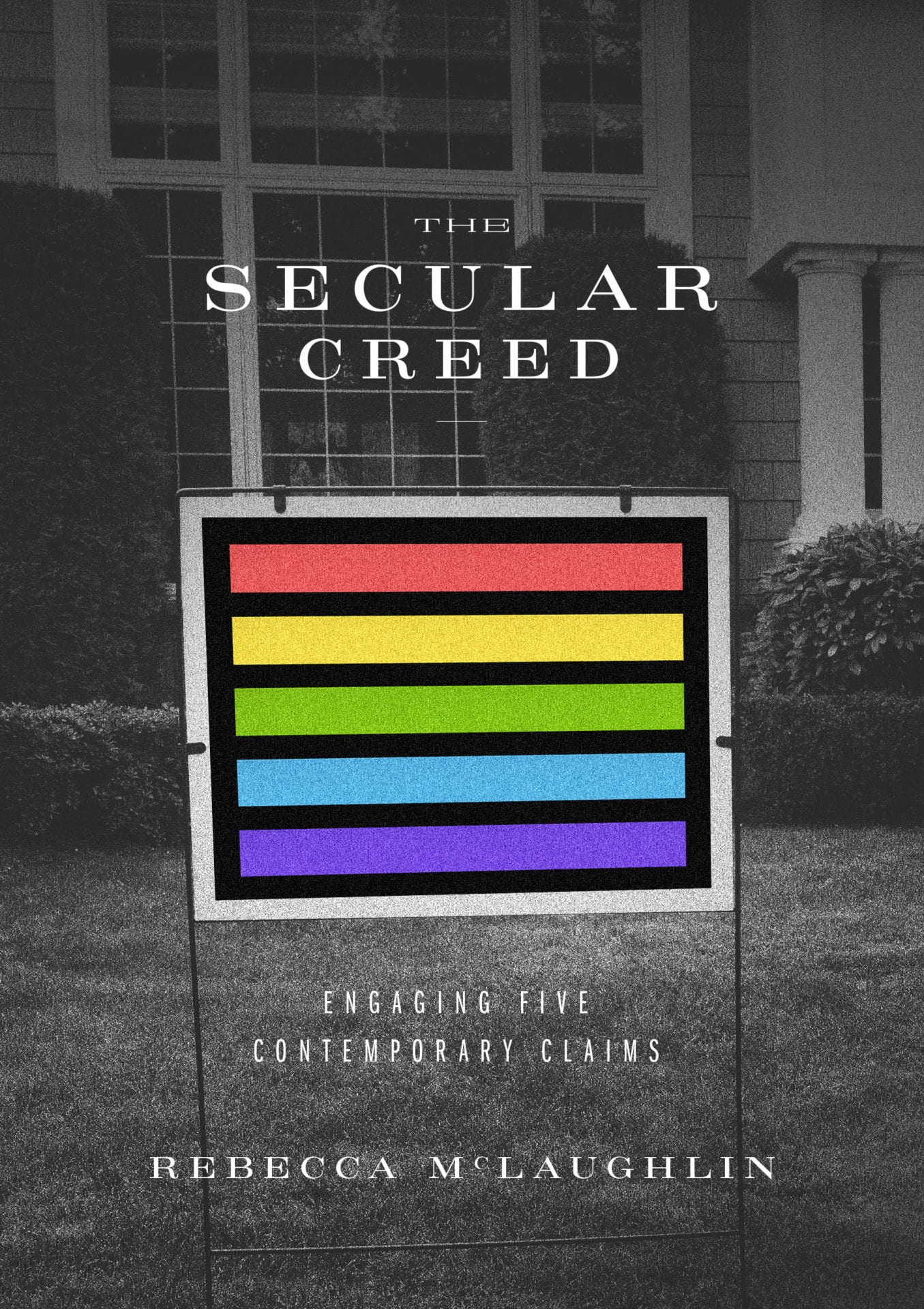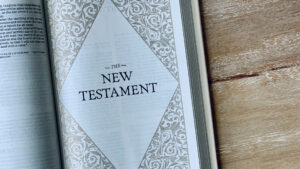Towards the end of each year, as December rolls around, I know Christmas is right around the corner by the music that is played in the supermarket. The sound of Jingle Bells or Little Drummer Boy plays through a speaker somewhere in the distance. And while I may not be actively listening, I can probably belt out every lyric off-by heart. Why? Simply because of how frequently I’ve heard them play in the background. In today’s society there is a secular creed or song, so to speak, playing in the background of our lives. Similar to the Christmas carols, it is giving us an indication of the type of society that we are living in. And again, like those Christmas songs we all know so well, this secular creed is increasingly familiar to many of us.
Simmering under the surface of those statements are beliefs. Convictions.
Whether scrolling through Tik-Tok, watching Netflix, or even tuning into the morning news, the world’s beliefs are pervasive. The popular phrases “Black Lives Matter,” “my body, my choice,” or even “love is love” are everywhere. We’ve heard each time and time again. But simmering under the surface of those statements are beliefs. Convictions. So they’re more than phrases; they’re creeds. And each has vastly influenced us and our world. Just like the words of Christmas songs are etched into our minds through repetition, so too are the words of the secular creeds. So for many Christians, it is becoming increasingly difficult to know how (or even if) we should respond to what the world is saying.
A Crucial Book for Our Secular Age
In many ways, Rebecca McLaughlin’s book, The Secular Creed models how to best engage with the beliefs around us. In her examination of five contemporary claims she demonstrates both uncompromising reason and charitable engagement. McLaughlin offers direct and challenging truths to both believers and non-believers alike, writing with great humility and love. In five chapters, the book critically and biblically examines five modern beliefs or claims of the secular world. While McLaughlin offers a survey and critique of each, she also challenges the church, who have often responded in hurtful and unhelpful ways.
How Do We Engage with ‘Black Lives Matter’?
In her first chapter, McLaughlin unpacks the phrase ‘Black Lives Matter.’ Doing so, she seeks to answer the question of how Christians can engage with and relate to this slogan. With an argument deeply rooted in biblical truth, McLaughlin establishes that human rights as a concept, and the equality of people of all ethnicities, has its foundation in Christian ethics (p20-22).
It is a lack of faith that leads to individuals being complicit in racial oppression.
Moreover, from the very beginning, God’s people have always included a diverse multitude. Moving through the Bible’s narrative, McLaughlin demonstrates diversity on every page, which ultimately culminates in the countercultural call of the gospel. This call invites people of every tribe, nation, and tongue to worship Jesus (Revelation 7:9-10). As McLaughlin writes: “Love across racial difference isn’t just a modern, progressive ideal. It started as a biblical ideal” (p15). Ultimately it is not true faith and obedience to God, but a lack thereof, that leads to individuals being complicit in racial oppression.
McLaughlin successfully redeems ‘Black Lives Matter’ from a progressive agenda to a statement that all Christians should gladly affirm. Black lives do matter to Jesus. This chapter urges believers to have their assumptions about the nature of the church corrected and also reaffirms the Bible’s call for justice and love across all types of divides (p23).
Is All ‘Love’ Equal?
In the second chapter, McLaughlin addresses another secular creed, the claim that ‘love is love.’ In this chapter she contrasts it with the biblical teaching that God is love.

The Secular Creed: Engaging Five Contemporary Claims
Rebecca McLaughlin
The Secular Creed: Engaging Five Contemporary Claims
Rebecca McLaughlin
In this house we believe that:
- Black Lives Matter
- Love Is Love
- Gay Rights Are Civil Rights
- Women’s Rights Are Human Rights
- Transgender Women Are Women
You may have seen signs with some of these messages in your neighbourhood. They offer us an all-or-nothing package deal—in short, a secular creed.
In this provocative book, Rebecca McLaughlin helps us disentangle the beliefs Christians gladly affirm from those they cannot embrace, and invites us to talk with our neighbours about the things that matter most. Far from opposing love across difference, McLaughlin argues, Christianity is the original source and firmest foundation for true diversity, equality, and life-transforming love.
However, McLaughlin doesn’t simply highlight biblical proof-texts that prohibit homosexual relationships. Instead she traces the Bible’s picture of marriage and relationships throughout. She shows that God’s ‘no’ to homosexuality is only one part of the greater story. In a similar way, heterosexual marriage is another part. Marriage must be situated, McLaughlin continues, not as the end goal of abundant life, but as a signpost. A pointer to the greatest love of all: Christ’s perfect, unfailing love for his church (p29-31).
God’s ‘no’ to homosexuality is only one part of the greater story. In a similar way, heterosexual marriage is another.
Because “marriage is meant to point us to Christ” (p31), perfect love can only be found in union with Christ. Thus responding to the claim that ‘love is love,’ the church should demonstrate God’s picture of love. So McLaughlin urges the church to be a people that model Christ’s love to those battling same-sex attraction. She writes: “The arms of those who are Jesus’s body here on earth should be his tangible embrace” (p40).
Pointing to 1 John 3:16, McLaughlin highlights that while Christ’s love is pictured in marriage, it’s also seen in the love of Christian brothers and sisters, willing to lay down their lives for one another. Because Christ knit us together as brothers and sisters, we must learn to prioritise and value the family of the church. We need to realise that those who struggle with same-sex attraction should be loved by the church. This will point them to the greatest love of all: the love of Jesus Christ (p39-41).
Can We Equate the Gay Rights Movement with the Civil Rights Movement?
In the third chapter, McLaughlin addresses attempts to conflate the civil rights movement with the gay rights movement. While initially a little unclear, McLaughlin explains why we cannot see these movements in the same way. So McLaughlin writes: “Repenting of racial injustice means turning back to the Bible. Affirming gay marriage for believers means turning away” (p47).
To condone gay marriage amongst believers today, Christians have to work very hard to twist the biblical text.
Those who view these movements similarly argue that Christians are once again on wrong side of history. They are, so the claim goes, oppressing the LGBTQIA+ community in the same way that they did African Americans. The problem with this claim, however, is that to condone gay marriage amongst believers today, Christians have to work very hard to twist the biblical text, similarly to the way white Christians distorted the Bible to make it condone racial oppression.
McLaughlin boldly, but with much grace, rebukes the church’s sin in previous ages. Because the church partook in widespread oppression and hate for so long, we face this current claim. And, sadly, we’ve given LGBTQAI+ communities an example in our history to weaponise. Throughout this chapter McLaughlin calls the church to repentance, urging us to change the narrative. Yes, we must firmly uphold the truth. But we must do so with love and sincere compassion.
What About Women’s Rights?
McLaughlin then turns to the feminist ideal and secular creed that says ‘women’s rights are human rights,’ examining the treatment of women and the much-debated topic of abortion. Correcting the misconception that the Bible is oppressive towards women, McLaughlin shows that Jesus himself modelled love and respect for women. This was especially true of those reviled by society. In contrast to secular claims, the Bible and Jesus’ example affirm the equality, dignity, and value of women. We learn that women are made in the image of God. Jesus provides us with one of the most counter-cultural treatments of women. And he calls his disciples to follow his example.
The Bible affirms the equality of women. However, God extends this equality to the life of unborn children as well.
Furthermore, in this chapter McLaughlin examines women’s sexual liberation and the ‘right’ to abortion. Citing multiple studies, McLaughlin argues that the secular promise that commitment-free sex leads to personal freedom is a “poisoned chalice” (p64). For it doesn’t live up to what it promises (p74-75). Contrary to this secular creed, the Bible affirms the equality of women. However, God extends this equality to the life of unborn children as well. The central pillar in women’s rights is not, and can never be, abortion. Rather, the Bible affirms that it is their identity as created in the image of God which establishes their dignity and worth.
Are Trans Women Women?
The final chapter addresses the claim that ‘Trans women are women.’ McLaughlin unpacks core ideas surrounding the transgender movement. Throughout this chapter, it becomes clear that by affirming transgender women as women, we essentially empty the word ‘woman’ of any real meaning. Moreover, the assertion that transgender women are women reinforces the very gender binary that secular society is trying to do away with. If gender and biological sex don’t exist, why assert so vehemently that transgender people fit into a particular gender category?
By affirming transgender women as women, we essentially empty the word ‘woman’ of any real meaning.
McLaughlin also addresses the reality of intersex, which is often cited in the transgender debate. Some people are born with a biologically ambiguous anatomy. Jesus himself acknowledged that there are those who are born eunuchs, and that they are precious in God’s sight and fully welcomed into God’s family (Matthew 19:11-12). As Christians our primary identity and value is not based upon our ability to have children, but on our new identity in Christ. Only, this reality does not undermine the truth that we are created male and female.
Particularly significant in this chapter is McLaughlin’s point that we are called to tread carefully, with great love and sensitivity, when dealing with individuals grappling with gender dysphoria and intersex. She writes, powerfully: “Sometimes, we love people best by acknowledging that we don’t understand.” This does not mean we blindly accept secular claims, or that we give up speaking the truth. Rather, it calls on the church to hold out the amazing hope that Jesus offers to all people. We must herald the comforting truth that we’re loved by God, and that there will come a day, when he will “make our groaning bodies new” (p103).
Learn to Discern the Secular Creeds
It may not be problematic to unknowingly learn lyrics to songs played in the supermarket. But when it comes to the pervasive chant of secular creeds we need to be alert. McLaughlin models how Christians must critically engage with the world’s claims. We must humbly search the scriptures so that God can both correct us and the many misguided beliefs of our secular societies.
McLaughlin points us to the radical, counter-cultural, and incredibly powerful nature of the gospel, embodied in our Lord Jesus Christ. But it also shows us that the truth of the Bible stands the test of time, answering every claim and change that confronts believers. The Secular Creed ultimately challenges us to look again to the beautiful example of Christ—who created all people equal in his image, includes all people in his kingdom, models perfect justice, and gave us the clearest expression of love in himself.













